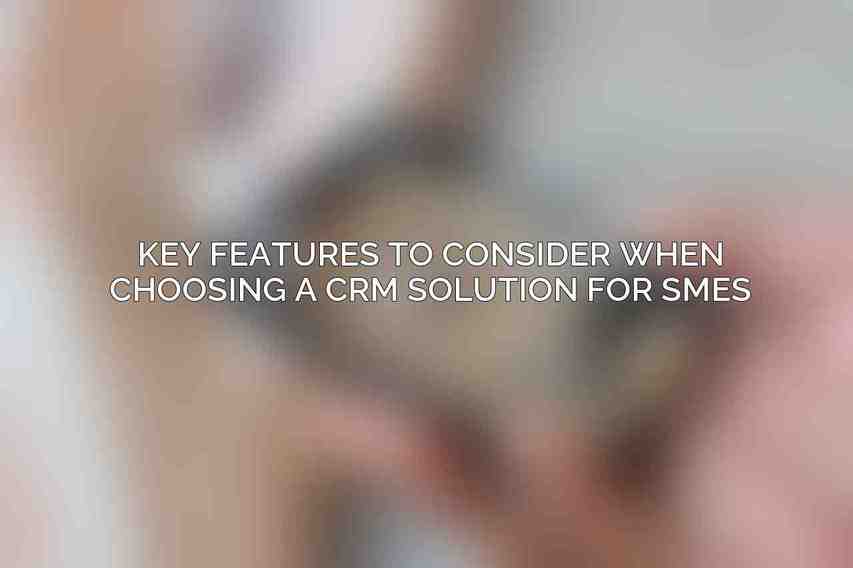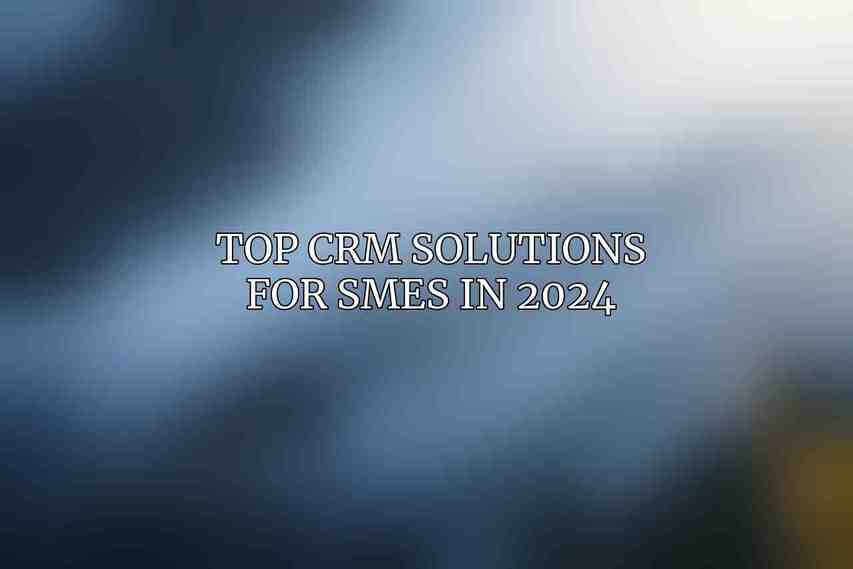Customer Relationship Management (CRM) is a strategy that businesses use to manage interactions with current and potential customers. For Small and Medium-sized Enterprises (SMEs), CRM plays a crucial role in establishing and nurturing customer relationships. It helps in understanding customer needs, improving customer satisfaction, and driving sales growth. In this competitive market, having an effective CRM system is no longer a luxury but a necessity for SMEs to stay ahead.
Benefits of CRM for SMEs:
Improved customer management: CRM systems enable SMEs to centralize customer data, track interactions, and provide personalized services.
Enhanced sales and marketing efforts: By analyzing customer data and behaviors, SMEs can tailor their sales and marketing strategies to target the right audience effectively.
Streamlined operations and increased efficiency: Automation of repetitive tasks, streamlined workflows, and better communication within the organization lead to improved operational efficiency.
Key Features to Consider When Choosing a CRM Solution for SMEs:

A. Contact management:
Contact profiles and segmentation: Ability to categorize contacts based on various attributes for targeted communication.
Activity tracking and history: Keep a record of all interactions with customers for better relationship management.
Lead scoring and qualification: Evaluate and prioritize leads based on their likelihood to convert into customers.
B. Sales management:
Pipelines and deal stages: Visual representation of sales stages for better tracking and forecasting.
Sales forecasting and analytics: Predictive tools to forecast sales trends and make informed decisions.
Automated workflows and reminders: Automation of tasks like follow-ups and notifications to streamline the sales process.
C. Marketing automation:
Email campaigns and segmentation: Tool to create targeted email campaigns and analyze their performance.
Social media integration: Manage social media interactions and track their impact on customer engagement.
Lead generation and nurturing: Strategies to attract potential customers and guide them through the sales funnel.
D. Customer service:
Ticketing and case management: System to track and resolve customer issues efficiently.
Knowledge base and self-service options: Provide customers with easy access to information and solutions.
Customer feedback and satisfaction tracking: Gather feedback to understand customer satisfaction levels and improve services.
E. Integration capabilities:
Integration with accounting and ERP systems: Seamless integration with existing systems for a holistic view of business operations.
Integration with email and productivity tools: Syncing with email platforms and productivity tools for enhanced collaboration.
Cloud-based access for remote teams: Ensure accessibility from anywhere for teams working remotely.
Top CRM Solutions for SMEs in 2024:

A. Salesforce Essentials:
Features: Salesforce Essentials offers robust contact management, sales tracking, and lead generation tools.
Pricing: Starting at $25 per user per month.
Pros: User-friendly interface, extensive integrations with other business tools.
Cons: Limited customization options may be a drawback for some SMEs.
B. HubSpot CRM:
Features: HubSpot CRM provides contact management, marketing automation, and customer service capabilities.
Pricing: Free plan available, with paid plans starting at $45 per month.
Pros: All-in-one solution with powerful marketing tools for SMEs.
Cons: Some users may find it complex to navigate the platform.
C. Zoho CRM:
Features: Zoho CRM offers contact and sales management features, as well as project management tools.
Pricing: Starting at $14 per user per month.
Pros: Comprehensive feature set, customizable workflows to suit specific business needs.
Cons: Might have a steeper learning curve and could be overwhelming for small businesses.
D. Freshsales CRM:
Features: Freshsales CRM focuses on contact management, sales automation, and provides AI-powered insights.
Pricing: Starting at $15 per user per month.
Pros: Intuitive interface, AI-driven predictions for enhanced sales strategies. Get the scoop on our perspective regarding Optimizing Your SME: CRM Integration Techniques and Tools
Cons: Reporting capabilities might be limited for in-depth analysis.
E. Pipedrive CRM:
Features: Pipedrive CRM specializes in sales pipeline management, visual dashboards, and detailed deal insights.
Pricing: Starting at $12.50 per user per month.
Pros: Tailored for sales teams, customizable pipelines to fit unique sales processes.
Cons: Less focused on marketing automation features compared to other solutions.
Implementation and Best Practices for SMEs:
A. Define clear CRM goals and objectives:
Setting specific goals helps in aligning the CRM implementation with the business objectives and desired outcomes.
B. Involve key stakeholders in the selection and implementation process:
Engaging stakeholders across departments ensures that the CRM solution meets the diverse needs of the organization.
C. Customize the CRM solution to fit your specific needs:
Tailoring the CRM system to align with unique business processes and requirements enhances its effectiveness.
D. Train users and ensure adoption:
Providing comprehensive training to employees on using the CRM platform encourages adoption and maximizes its benefits.
E. Monitor and evaluate CRM usage and performance regularly:
Regular monitoring of CRM usage and performance metrics allows for continuous optimization and improvement.
CRM solutions are indispensable tools for SMEs looking to strengthen customer relationships, boost sales, and streamline operations. The top CRM solutions highlighted for 2024 cater to various business needs with their unique features and pricing structures. By selecting and implementing a CRM system effectively, SMEs can leverage technology to drive growth and success in a competitive market world. Remember, the key to CRM success lies in aligning the chosen solution with the specific goals and objectives of the business.
Frequently Asked Questions
1. What are some key features to look for in CRM solutions for SMEs?
Some key features to look for in CRM solutions for SMEs include ease of use, scalability, customization options, integration capabilities with other software tools, and affordable pricing plans.
2. Can you recommend any specific CRM solutions that are ideal for SMEs?
Some top CRM solutions for SMEs in 2024 include HubSpot CRM, Zoho CRM, Salesforce Essentials, Pipedrive, and Freshworks CRM. These platforms offer a range of features tailored to the needs of small and medium-sized businesses.
3. How can CRM solutions help SMEs improve customer relationships and drive sales?
CRM solutions can help SMEs improve customer relationships by providing a centralized database for customer information, tracking interactions and communications, automating repetitive tasks, and generating valuable insights through analytics. This can lead to better customer engagement, increased sales, and improved overall productivity.
4. What are the potential challenges SMEs may face when implementing CRM solutions?
Some potential challenges SMEs may face when implementing CRM solutions include resistance to change from employees, data migration issues, training requirements, customization complexities, and ensuring data security and compliance. It is important for SMEs to address these challenges proactively to maximize the benefits of a CRM system.
5. How can SMEs ensure successful adoption and usage of CRM solutions among their teams?
To ensure successful adoption and usage of CRM solutions among their teams, SMEs should provide adequate training and support to employees, involve key stakeholders in the decision-making process, set clear goals and objectives for CRM implementation, regularly monitor and evaluate performance metrics, and continuously seek feedback and optimize processes based on user experiences.

